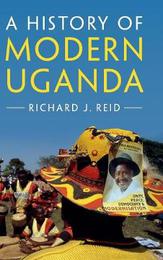
|
A History of Modern Uganda
Hardback
Main Details
| Title |
A History of Modern Uganda
|
| Authors and Contributors |
By (author) Richard J. Reid
|
| Physical Properties |
| Format:Hardback | | Pages:328 | | Dimensions(mm): Height 235,Width 158 |
|
| Category/Genre | African history
Colonialism and imperialism |
|---|
| ISBN/Barcode |
9781107067202
|
| Classifications | Dewey:967.61 |
|---|
| Audience | | Professional & Vocational | | Tertiary Education (US: College) | |
|---|
| Illustrations |
8 Maps
|
|
Publishing Details |
| Publisher |
Cambridge University Press
|
| Imprint |
Cambridge University Press
|
| Publication Date |
2 March 2017 |
| Publication Country |
United Kingdom
|
Description
This book is the first major study in several decades to consider Uganda as a nation, from its precolonial roots to the present day. Here, Richard J. Reid examines the political, economic, and social history of Uganda, providing a unique and wide-ranging examination of its turbulent and dynamic past for all those studying Uganda's place in African history and African politics. Reid identifies and examines key points of rupture and transition in Uganda's history, emphasising dramatic political and social change in the precolonial era, especially during the nineteenth century, and he also examines the continuing repercussions of these developments in the colonial and postcolonial periods. By considering the ways in which historical culture and consciousness has been ever present - in political discourse, art and literature, and social relationships - Reid defines the true extent of Uganda's viable national history.
Author Biography
Richard J. Reid is Head of the Department of History and Professor of the History of Africa at the School of Oriental and African Studies, University of London. He is the author of several books, including Frontiers of Violence in Northeast Africa (2011) and Warfare in African History (Cambridge, 2012).
Reviews'An exceptional book, which seeks to restore the nation as a focus of historical enquiry in Africa. Reid reframes Uganda's history, moving away from standard narratives of ethnic and sectarian division, and identifying alternative unifying themes - the political creativity, and inequity, stimulated by violence; migration as a source of uneasy integration at best, deepening chauvinism at worst; and the enduring significance of the precolonial period. This reflective, erudite study sheds new light on the uneven creation of a nation, formed through the organic, internal, autogenerative processes of political and social affiliation, as much as the externally-imposed architecture of borders and flags.' Shane Doyle, Director of the Leeds University Centre for African Studies (LUCAS) 'From Kintu the first man on earth and founder of the Buganda kingdom to Kiprotich the 2012 Olympic marathon winner, Reid constantly confronts past and present with a fine disregard for chronology to prove that a national history is possible for even the most divided of nations. Product of an unequal political geography centuries old and of a botched British decolonisation, ruined times over by military adventurers since, Uganda is nonetheless tied together by lively cultures of personal ambition, networks of social mobility, and artistic creativity. This is a tour de force, based as much on sharp-eyed fieldwork as on archival and bibliographic mastery.' John Lonsdale, Centre of African Studies, University of Cambridge 'A History of Modern Uganda elegantly offers both a much needed overview of Uganda's history that is grounded in its deeper past and shows the ways that history reverberates into the present. By consistently and very effectively pulling the north and east into dialogue with the south and west, Reid powerfully makes the case for a national history that predates the Uganda Agreement of 1900, all while demonstrating the transformative nature of the twentieth century.' Rhiannon Stephens, Columbia University, New York
|